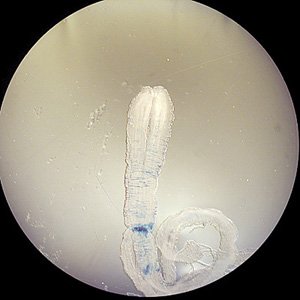Doctors have removed a nearly five-inch-long flesh-eating tapeworm from the head of a Chinese man, who became infected 15 years ago.
Wang Lei, from the city of Guangzhou in southeast China, underwent a two-hour-long procedure at the Guangdong Sanjiu Brain Hospital during which medical staff took out the parasite, belonging to the species Sparganum mansoni, the Daily Mirror reported.
These tapeworms usually live in the intestines of dogs and cats as adults. However, the larvae can be ingested by humans, according to the Centers for Disease Control and Prevention (CDC).
These larvae can cause a parasitic infection known as sparganosis, the symptoms of which can vary depending on where they migrate to in the host's body.
The parasite can end up in several places, including the breast, urinary tract, lungs, abdominal organs, central nervous system and subcutaneous tissue—the innermost layer of skin.
When the parasite ends up in the subcutaneous tissue, the victim may develop painful nodules. If it finds its way to the ear, the patient can experience vertigo or deafness. But if it reaches the brain or spine, the host can suffer a variety of neurological symptoms, including weakness, headaches, seizures and abnormal skin sensations, such as numbness or tingling.
Lei said that he began to feel numbness down his left side in 200. Since then, his health has gradually worsened, to the point where he suffered frequent seizures and blackouts.
The man saw several specialists in an attempt to find out what was causing his problems. He was even treated for a suspected malignant brain tumor before doctors eventually discovered a tapeworm living in his head in 2018.

Initially they advised him to undergo a non-surgical form of treatment given that the location of the tapeworm made an operation risky. However, this treatment was not successful and doctors finally decided to operate.
"The surgery was risky," Doctor Gu from Sanjiu Brain Hospital told reporters. "The live tapeworm was moving in his brain and we had to remove all of it otherwise the leftover part could grow again."
"It is not the only case, our hospital has treated four patients this year," he said. "People should be careful when cooking frogs, snails and snakes that need to be cooked thoroughly. Also, do not drink water in the wild unless it has been boiled."
Sparganosis is rare although cases have been reported in Asia, Africa, Australia, South America, and the U.S. The majority of cases occur in southeast Asian and East African countries.
Uncommon Knowledge
Newsweek is committed to challenging conventional wisdom and finding connections in the search for common ground.
Newsweek is committed to challenging conventional wisdom and finding connections in the search for common ground.
About the writer
Aristos is a Newsweek science reporter with the London, U.K., bureau. He reports on science and health topics, including; animal, ... Read more





